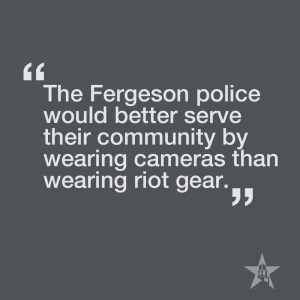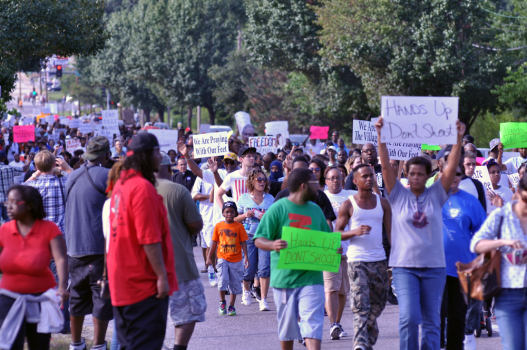Following the grand jury decision to not indict Darren Wilson for any crimes in the killing of Michael Brown, the matter remains, in the hearts and minds of many, unresolved. What now?
On the most basic level, we must resolve the injustice in Brown’s death: a human being died at the hands of a police officer under circumstances steeped in a deeply troubling senselessness or even maliciousness.
Brown deserves justice, but justice is not wholly dependent on what happens to Wilson. Complete justice involves a larger scope. It requires tackling not just an individual but the system from which that individual emerged and the flaws in that system which people perpetuate with continued unresponsiveness.
By now you have probably heard the prevalent slogans, “Black Lives Matter” and “Hands Up, Don’t Shoot.” These simple but poignant phrases address two major concerns in Ferguson: racism and police brutality. Advocating police accountability offers partial solutions to both.
 As Michael Jeffries said in The Boston Globe, “The simplicity of the phrase [Black Lives Matter] is a national shame.” While we struggle to figure out the degree to which Brown’s race influenced Wilson’s actions, Jeffries pointed out that, “Brown is described as ‘it’ and ‘a demon’ in his killer’s testimony.” While this does not directly indicate racism, it portrays with disturbing clarity Wilson’s sense of otherness towards Brown: Wilson has stripped Brown of his humanity.
As Michael Jeffries said in The Boston Globe, “The simplicity of the phrase [Black Lives Matter] is a national shame.” While we struggle to figure out the degree to which Brown’s race influenced Wilson’s actions, Jeffries pointed out that, “Brown is described as ‘it’ and ‘a demon’ in his killer’s testimony.” While this does not directly indicate racism, it portrays with disturbing clarity Wilson’s sense of otherness towards Brown: Wilson has stripped Brown of his humanity.
“Hands Up, Don’t Shoot” addresses the police’s use of excessive force. A chart compiled by PBS Newshour indicated witnesses agreed with high consistency that Brown put his hands up in surrender when Wilson fired upon him. At least six of Wilson’s shots hit Brown, two of which impacted his head. After Brown’s death, the police abused peaceful protestors. According to a Vox article by German Lopez, “police donned riot gear, wielded sniper rifles, rode on armored vehicles that resembled tanks, fired rubber bullets, and launched tear gas – a chemical weapon banned from international warfare – into demonstrating crowds.” Beyond the obvious physical harm this caused, the police’s actions blew open an already perilously wide trust gap between the residents of Ferguson and the police.
According to The Washington Post editorial board, “Congress in 1994 told the Justice Department to collect and publish national numbers on the excessive use of force, but federal officials have never managed to do it.” The system will not change without transparency.
In the past few years American police forces have started implementing body cameras and car dashboard cameras. The Ferguson Police Department owns cameras, but Police Chief Thomas Jackson said the department does not have the money to implement the technology. The Ferguson police would better serve their community by wearing cameras than wearing riot gear.
 Shadee Ashtari and Sara Boboltz said in the The Huffington Post that police obtain military-grade weaponry largely through the 1033 program which provides “billions of dollars’ worth of surplus military weapons at no charge” to police departments nationwide. The police action following Brown’s death indicates a significant need for greater accountability regarding the equipment and its use. It would make more sense if police received free cameras and had to budget for weaponry according to necessity.
Shadee Ashtari and Sara Boboltz said in the The Huffington Post that police obtain military-grade weaponry largely through the 1033 program which provides “billions of dollars’ worth of surplus military weapons at no charge” to police departments nationwide. The police action following Brown’s death indicates a significant need for greater accountability regarding the equipment and its use. It would make more sense if police received free cameras and had to budget for weaponry according to necessity.
Similarly, Wilson’s actions against Brown imply a basic need within the police force to increase officer training that focuses on de-escalating an altercation. Retired police sergeant and criminal justice educator Peter Jirasek told The Huffington Post that “if you only seek to wound someone by shooting, you do not have justification to shoot at all.”
I feel powerless when faced with an issue as ubiquitous and enigmatic as police accountability, but as a first step we can sign various petitions created as backlash to the police’s use of force against peaceful protestors and supporting the dissolution of the 1033 program. In the long term we can pay closer attention to the bents of the politicians we vote for. Maplight, a nonpartisan research organization, has a map displaying which house representatives voted for a congressional amendment which would have effectively disbanded the 1033 program had it passed. We must educate ourselves because we have no simple or quick solution to injustice; we must vote into power politicians committed to standing with us in solidarity.
Ferguson has the power to take the media attention it has already gained and direct the attention of politicians, police, and voters alike by putting the spotlight on important conversations – racism and police accountability – so let’s talk.


